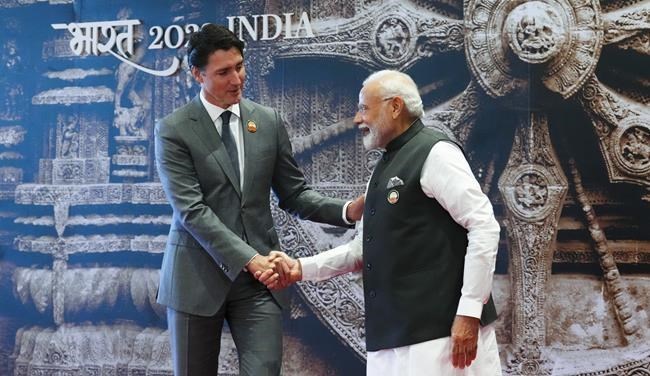NEW DELHI — Global economic leaders have agreed on a final declaration at the G20 summit, but the language surrounding Russia's invasion of Ukraine — which is leading to geopolitical tensions — has softened since the leaders last met.
The consensus statement from this year's G20 summit in India was posted by India's Ministry of Foreign Affairs on Saturday, a day before the summit ends.
It calls for the cessation of military destruction or other attacks on relevant infrastructure, as the violence is impacting food and energy security, and affecting supply chains.
Gone is language used during last year's G20 summit in Bali, where leaders directly called out Russia's aggression in Ukraine and demanded its troops withdraw from the territory.
Senior Canadian government officials who spoke on the condition they not be named said it took months to get the wording where it is. But they wouldn't say what other countries had also pushed for stronger language.
China and Russia, whose leaders both skipped the summit and sent officials in their place, had already rejected any wording condemning the invasion in Ukraine.
India took credit for getting a final communique. Amitabh Kant, the country's emissary at the summit, said the wording was clinched after days of "ruthless negotiations." Kant touted work done by Indian Prime Minister Narendra Modi, who demanded a resolution.
In a post on Facebook, Ukrainian Foreign Minister Oleg Nikolenko thanked countries who pushed for stronger language, but added the communique is "nothing to be proud of."
Indian Minister of External Affairs Subrahmanyam Jaishankar said the G20 is about economic co-operation. He suggested there are other forums where social issues are more widely important, such as the G7.
"It's quite reasonable to assume there's a spectrum of views and interests out here which we have tried to harmonize to produce the declaration," Jaishankar said.
Prime Minister Justin Trudeau expressed similar sentiments when visiting Singapore on Friday, saying the G7 has more like-minded countries that share the same values.
He spent the week touring the Indo-Pacific region after making stops in Jakarta and Singapore to promote Canadian talent and goods following economic disruptions brought on by the COVID-19 pandemic and Russia's invasion of Ukraine. The war has amplified calls in the region for an accelerated energy transition and greater food security.
The G20 urged the resumption of grain, foodstuffs and fertilizer shipments from Russia and Ukraine, saying it was necessary to feed people in Africa and other parts of the developing world.
The communique also focused on gender equality, countering terrorism and money laundering, and building digital technology and green infrastructure.
Modi, who made the summit about the Global South, had welcomed the African Union as its newest permanent member. The European Union is the only other regional bloc that holds permanent membership.
The focus of the day's first leader session was "One Earth," followed by "One Family."
Trudeau spent time in between sessions sharing a laugh with U.S. President Joe Biden and European Commission President Ursula von der Leyen, and mingling with U.K. Prime Minister Rishi Sunak.
His only bilateral meeting was with World Bank President Ajay Banga.
The Canadian Press pool reporter was unable to report on the meeting because the Prime Minister's Office gave its last media pass to Trudeau's official videographer.
A readout from the PMO said the two discussed providing aid to developing countries and helping Ukraine rebuild from the war.
Representatives from major Canadian media outlets typically accompany Trudeau on foreign trips to report on events. A smaller group, called the pool, is normally given access to events where space is limited. They then share that content with the rest of the media on the trip.
The PMO wouldn't say when they last barred a pool reporter from an event.
"We should have given additional access to the pool reporter," the PMO said in a statement on Saturday.
Christopher MacLennan, Trudeau's personal representative at the summit, said the Canadian government takes media access for these events "very seriously."
The prime minister later skipped out on the G20 leaders dinner hosted by Modi, and sent MacLennan in his place. His office wouldn't say why, but he is expected to attend the last day of the G20 Summit on Sunday before heading back to Canada.
This report by The Canadian Press was first published Sept. 9, 2023.
— With files from The Associated Press.
Mickey Djuric, The Canadian Press



